| Srl | Item |
| 1 |
ID:
109813
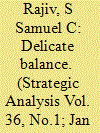

|
|
|
|
|
| Publication |
2012.
|
| Summary/Abstract |
India's foreign policy interactions with Israel are marked by a political discreetness which is in contrast to its prominent political engagement with the Palestinians and countries of the Arab world. India plays down its robust defence engagement with Israel, censures Israeli policies regarding the Palestinians, supports Palestinian-related resolutions at multi-lateral forums like the UN, differs strongly from Israeli policy on issues such as Iran's nuclear programme while being opposed to the possibility of Iran acquiring nuclear weapons capability. This policy has expanded the space for India to pursue its foreign policy and national interest goals, as attested to by the robust political and economic interaction with the Palestinians and the Arab countries, and rising defence and economic engagement with Israel despite certain domestic constituencies opposed to such a partnership. However, the limitations of such a policy include the minimal role that India has been able to play in the Middle East peace process, 'diplomatic heartburn' of an ally deeply involved in the security sphere-as is evident in the Israeli reaction to the Indian stance on the Goldstone report, for instance-and limited 'comfort zones' if crisis situations arise. Greater political engagement could be a bulwark against such tendencies and also provide important opportunities to convey India's concerns regarding the Palestinians more forcefully.
|
|
|
|
|
|
|
|
|
|
|
|
|
|
|
|
| 2 |
ID:
117736
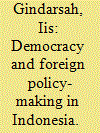

|
|
|
|
|
| Publication |
2012.
|
| Summary/Abstract |
This article studies the impact of domestic politics on Indonesia's foreign policy-making. Serving as a non-permanent member of the United Nations Security Council (UNSC) from 2007 to 2008, Indonesia voted on two key resolutions concerning the Iranian nuclear issue. While approving international sanctions against Iran under UNSC Resolution No. 1747, the Indonesian government abstained from voting on Resolution No. 1803 which imposed additional sanctions on Tehran. This article argues that the country's changing response to the Iranian nuclear issue was a consequence of domestic opposition. The case study specifically identifies the Muslim-majority population, religious mass organizations, and political parties, as key factors which weighed upon the "risk calculus" behind Indonesia's foreign policy formulation. The article concludes that while the executive still drives the countrys foreign policy, Indonesias Parliament and social-political groups have gained new powers to influence the government into changing or even reversing existing policies.
|
|
|
|
|
|
|
|
|
|
|
|
|
|
|
|
| 3 |
ID:
125328
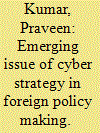

|
|
|
|
|
| Publication |
2013.
|
| Summary/Abstract |
There have been various cases like that of alleged attacks on South Korean cyber interests (banks) by North Korea, joint targeting of the speculated Iran's nuclear programme by USA and Israel (Stuxnet), Chinese targeting of the networks of India (DRDO computers), USA (as revealed by Mediant Inc.), other European nations and businesses to serve its interests, and Russian targeting of the Estonian computer networks, among others, which indicate to the fact that various nation-states on this arena consider their interests similar to those of the real world.
|
|
|
|
|
|
|
|
|
|
|
|
|
|
|
|
| 4 |
ID:
129638
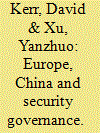

|
|
|
|
|
| Publication |
2014.
|
| Summary/Abstract |
Normative power can be defined as the ability to govern interdependencies by means of rules, regimes and compliance strategies. This paper presents two case studies in security governance-international responsibility to protect in Sudan and counter-proliferation policies towards Iran's nuclear programme-to evaluate the degree of normative convergence between China and Europe. It concludes that there are still major differences between Europe and China on employing normative strategies in security governance but that both modes of governance and identities as security actors are mobile so that the trend is towards convergence, albeit with some distance still to travel.
|
|
|
|
|
|
|
|
|
|
|
|
|
|
|
|
| 5 |
ID:
117535
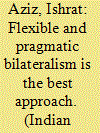

|
|
|
| 6 |
ID:
117533
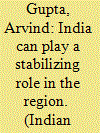

|
|
|
| 7 |
ID:
117532
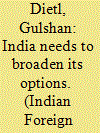

|
|
|
| 8 |
ID:
113163
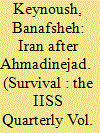

|
|
|
|
|
| Publication |
2012.
|
| Summary/Abstract |
Power struggles and political fragmentation have been endemic to the Islamic Republic of Iran since its founding in 1979. But although internal division may weaken the state, it is unlikely to break it. The multiple pillars of power in the Iranian republic protect it from sudden collapse. Loyalties can easily shift from one pillar to the next, allowing for the emergence of new political identities. Elections in particular - there have been 28 since the 1979 revolution - are a significant catalyst for such changes.
|
|
|
|
|
|
|
|
|
|
|
|
|
|
|
|
| 9 |
ID:
128605
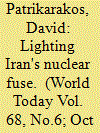

|
|
|
| 10 |
ID:
120155
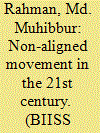

|
|
|
| 11 |
ID:
111819
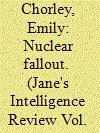

|
|
|
| 12 |
ID:
133682
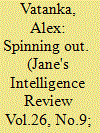

|
|
|
|
|
| Publication |
2014.
|
| Summary/Abstract |
With the new deadline for a final agreement on Iran's nuclear programme set for November 2014, interested parties gained four months to resolve their differences. Alex Vantanka examines the numerous pressures affecting a deal.
|
|
|
|
|
|
|
|
|
|
|
|
|
|
|
|
| 13 |
ID:
116647


|
|
|
|
|
| Publication |
2012.
|
| Summary/Abstract |
In recent months Israel's political and defence leaders have engaged in an unprecedented and vociferous public debate about Iran's nuclear programme, and about the advisability of an Israeli strike to destroy or delay it. Meir Dagan, the former head of the secret intelligence service Mossad, called an Israeli attack, at this time, 'the stupidest thing I have ever heard of', warned that it might ignite a regional war and stated that there was still a window of some three years, while the former head of the internal security agency Shin Bet, Yuval Diskin, stated that he did 'not trust' Prime Minister Benjamin Netanyahu's and Defense Minister Ehud Barak's 'messianic' leadership. The former chief of staff (2007-11) of the Israel Defense Forces (IDF), Gabi Ashkenazi, has been more restrained, but has made clear his opposition to an operation at this time, and even the current chief of staff, bound by the strictures of his office, has let it be known that he is not enthusiastic.
|
|
|
|
|
|
|
|
|
|
|
|
|
|
|
|
| 14 |
ID:
129031
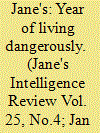

|
|
|